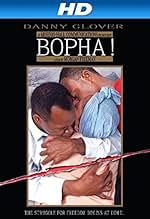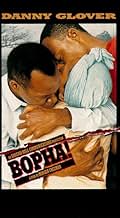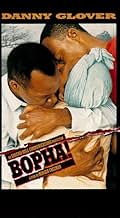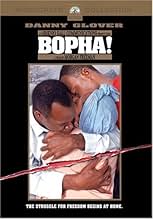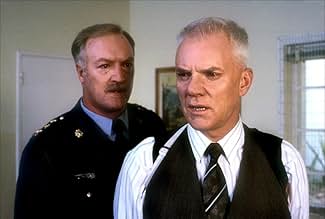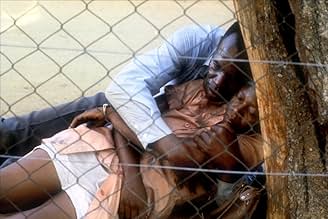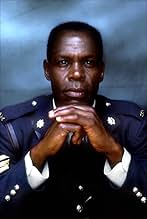In this story of a black policeman during South African apartheid, Danny Glover plays the cop, who believes he's trying to help his people, even while serving as a pawn of the racist governm... Read allIn this story of a black policeman during South African apartheid, Danny Glover plays the cop, who believes he's trying to help his people, even while serving as a pawn of the racist government. When his son gets involved in the anti-apartheid movement, he finds himself torn betw... Read allIn this story of a black policeman during South African apartheid, Danny Glover plays the cop, who believes he's trying to help his people, even while serving as a pawn of the racist government. When his son gets involved in the anti-apartheid movement, he finds himself torn between his family (including long-suffering wife Alfre Woodard) and what he believes is his d... Read all
- Awards
- 3 nominations total
- Lucy Van Tonder
- (as Julie Stridom)
- Director
- Writers
- All cast & crew
- Production, box office & more at IMDbPro
Storyline
Did you know
- TriviaMorgan Freeman's first film as a director.
- SoundtracksPIRI WANGO IYA
Written and Performed by Geoffrey Oryema
Courtesy of Realworld Records, Ltd./Virgin Records America, Inc.
The setting of the film is South Africa in 1980, in the Moroka section of Soweto, on the outskirts of Johannesburg (although in reality it was shot in Zimbabwe, since Apartheid had not yet ended while filming--that didn't occur until 1994). Historically, 1980 was somewhat of a middle period of internal opposition to Apartheid, which the South African government had begun to press even harder in the 1960s, leading to increasing protests and demonstrations and their attendant violence throughout the 1970s and 1980s.
Bopha! was originally a play by South African writer Percy Mtwa, and was earlier made into a semi-documentary television program that aired on PBS in the United States in 1986. Compared to the play, the film, directed by Morgan Freeman (his only directorial turn to date) significantly changes many of the characters, much of the story, and even the ending, which here is appropriately far more troubled and ambiguous than the "ray of hope" ending of the play.
The story is centered on Micah Mangena (Danny Glover) and his family, wife Rosie (Alfre Woodard) and son Zweli (Maynard Eziashi). Micah is trying to better his family with his income as a policeman, but it's a time when black policeman are seen as traitors to their own people, since they're enforcing the laws of Apartheid. The negative attitude towards them, approaching ostracism and in some cases lynching, even carries over to policeman's families. Despite the risk and periodic threats, Micah hopes that Zweli will follow in his footsteps, as it is a more desirable choice than the alternatives, and at first, Zweli plans to. But in school, Zweli's friends gain courage to organize protests, and Zweli helps them out by arranging a meeting with a famed local anti-Apartheid activist, Pule Rampa (Malick Bowens). Rampa is considered a "terrorist" by the authorities, and merely meeting to discuss such political issues is against the law, so turmoil quickly follows and ends up forcing father and son on different sides of the law.
Although Micah gets a lot of screen time and we learn something about the character, Freeman is unable to overcome an emotional distancing that makes it difficult to become invested as a viewer. Rosie and Zweli get less screen time, and feel even more distant. This especially hurts in the case of Zweli, as his character arc is essential to the impact of the film. For a large chunk of the middle, Zweli inexplicably disappears. The more minor characters can become completely lost and it is not always easy to keep track of them. It's difficult to not feel that Marius Weyers, as Micah's boss Van Tonder--the mostly understanding white guy, and Malcolm McDowell, as the villainous De Villers, aren't largely wasted. This is not to say that the events in the film involving all of the principal characters are not impactful, or that the actors do not turn in decent performances, but there just seems to be something relatively ineffable missing in the "chemistry" between performance, direction, script and editing.
I found it odd that one reviewer described Bopha! as an "action" film. Yes, there are scenes of protests turning to violence, there are scenes of protesters running from the police, being chased and occasionally being shot and so forth, but these are not at all the focus of the film. Far more often, Freeman goes about his realist drama story very deliberately. Some viewers--my wife was one--may feel that the film is too slow. And consider that my wife is from South Africa--she lived in the government's Indian settlement, Lenasia, right next to Soweto, and experienced similar events! So it's not that she was not interested in the material.
Freeman's directorial style is fairly pedestrian. He blocks scenes and conveys actions clear enough. He is rarely "showy" with his cinematography, although there are a couple shots of nice scenery, a nice wide shot of the township standing in for Soweto, a couple shots of sunsets and such. But this is a film that wants to hinge solely on its performances and on a heart-wrenching story in a complex time of turmoil. There are moments, such as a death in jail, a burned structure, characters who are shot, shot at and stabbed, and so on that should be as powerful as just about anything one can see in the cinema. But something about the story just doesn't click. It just feels too lightweight for what it should be, and consider this--I'm a viewer who very easily becomes emotional with such material; I very easily cry when I watch films. Unfortunately, I didn't shed a tear while watching Bopha!
Still, the subject and its handling are competent enough, and the historical content important enough to warrant a slight recommendation, especially for anyone who wants or needs to get a small glimpse into what Apartheid was about. The best film about Apartheid-era South Africa has not yet been made but needs to be. Until then, Bopha! and a handful of others, such as Cry Freedom (1987) and Mandela (1987), will have to suffice.
- BrandtSponseller
- Jun 8, 2005
- Permalink
- How long is Bopha!?Powered by Alexa
Details
Box office
- Budget
- $12,000,000 (estimated)
- Gross US & Canada
- $212,483
- Opening weekend US & Canada
- $88,390
- Sep 26, 1993
- Gross worldwide
- $212,483
- Runtime2 hours
- Color
- Aspect ratio
- 1.85 : 1
Contribute to this page



